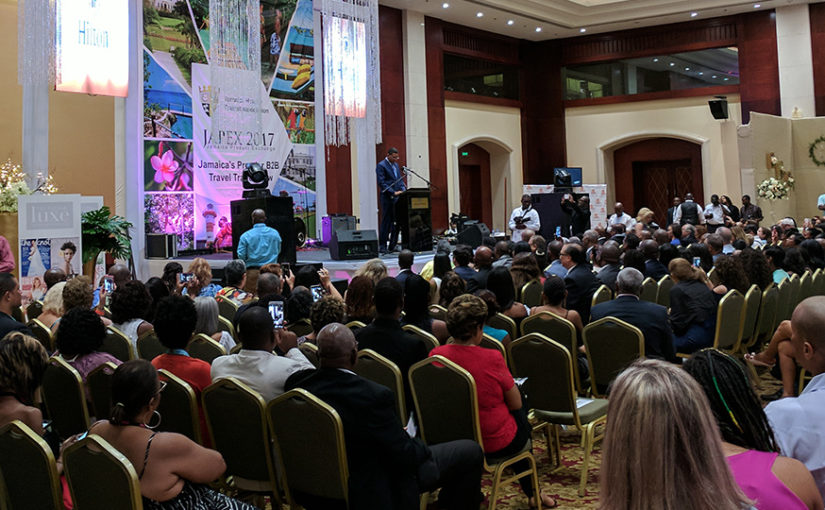At the moment I’m writing this article, I’ve just returned from the JAPEX conference in Jamaica. Now, I’ve traveled to the Caribbean islands a number of times, both for work and fun. The hospitality, the people, the energy are fantastic (as we’ve shared ourselves first hand.)
But this trip was different.

Not in the way you’d think. The hospitality was still top notch. The people? As friendly and welcoming as ever. And the speakers and attendees at JAPEX were all incredibly insightful.
But it was also grounded.
What I took away from JAPEX went well beyond the usual micro-level discussions that typically embody an event like this. It was the broad spectrum: an impressive (and sometimes sobering) macro-level look at challenges in the Caribbean that took the stage—from competing on a global scale to the recent hurricanes and more.
Working together to compete globally
Over the last several years, the Caribbean has excelled at marketing itself as a highly accessible, dream destination. And this is a good thing. My fellow panelist at the event, and Co-founder at Social Caddie, Javier Morales chimed in nicely as to why:
“It’s important for the Caribbean to be identified as a region. Organizations like the Caribbean Hotel and Tourism Association have been created as a major resource for all the islands. By pooling their resources, coming together as region helps them all have access to information and programs to succeed as a whole.”
This has helped introduce more travelers to the region, raising awareness on the global level up against other warm climate destinations. But it poses a unique dichotomy: the need to make known that the Caribbean is more than the sum of its parts.
A recent example? Hurricanes Irma and Maria—both which have come and gone, leaving effects that will linger for years.
Not surprisingly, that poses a problem for the unaffected islands as well as the entire region. Some destinations in the region won’t be visitor-ready in the foreseeable future, and the perception is that the Caribbean isn’t quite as attractive for that dream vacation it’s known and loved for.
Except that it is.
The Caribbean is comprised of more than 30 destinations with thousands of islands totaling over 95k square miles, making it an eclectic mix of unique and independent travel locales. In fact, CHTA partners with 1,000 hotels and allied members plus 32 National Hotel Associations to help shape the future of tourism in the region.
You can’t minimize the devastation for some of the island nations. But it remains a small percentage of the total area—with tourism in many of the areas continuing to grow. (And the others working diligently to bounce back.)
Putting out in force that in spite of the storms, the nations of the Caribbean are open for business is a must. Javier had a few more adds on the steps every island nation can take:
“Nearly every island has a tourism board or association to help market their destination. Islands should showcase their unique features to stand out in the group. Destinations and their hotels can work together to highlight these features and compete against other global destinations.”
Diversifying your marketing—at the regional, destination, and hotel levels
Another challenge that surfaced is one that’s more relatable for us mainlanders: OTA dependency. The core of this issue is a tough one to overcome.
The United States is a key feeder market for the region as a whole, and in the US we love to drive. It’s as much a part of our culture as baseball and BBQs. So when we visit our friends in the South, there’s more to the travel planning process. This is an arena where OTAs excel, making it incredibly easy to book an entire trip in one sitting.
We know dependency on any one channel can be risky. And while OTAs help put heads in beds, they don’t help in the long term to build relationships with your travelers to keep them coming back again and again.
Diversifying where and how you’re winning business is the first step to becoming less dependant on any single channel. The goal? Reach new travelers, and reach them in a better way.
Javier offered a few tips to start:
“The online world has changed and small destinations and hotels can now compete with the big guys. A well-developed website, strong SEO plan and social media strategy can help brands of all sizes get their fair share of the market.”
Another way? Advocacy. Arguably one of the most compelling ways to make an introduction, advocacy lets travelers to your region or hotel deliver an authentic perspective to a like-minded audience—by the thousands.
Rather than relying on the consumer to discover your marketing (or vice versa), those who’ve lived the experience are sharing the most memorable aspects with people they know. Trust comes built in, so the message is delivered clearly and effectively.
Writing the stories of the Caribbean
Not only is advocacy a remarkable tool for telling the story, (rather the stories,) of every Caribbean destination, it piggybacks on what the market is doing as a whole: inspiring new travelers by giving those who visit an opportunity to share their dream vacation—and those best equipped to do just that are arriving on the islands by the hour.
